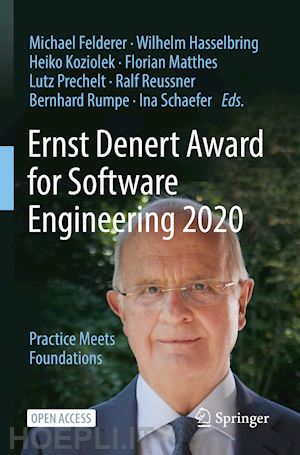
Questo prodotto usufruisce delle SPEDIZIONI GRATIS
selezionando l'opzione Corriere Veloce in fase di ordine.
Pagabile anche con Carta della cultura giovani e del merito, 18App Bonus Cultura e Carta del Docente
This open access book provides an overview of the dissertations of the eleven nominees for the Ernst Denert Award for Software Engineering in 2020. The prize, kindly sponsored by the Gerlind & Ernst Denert Stiftung, is awarded for excellent work within the discipline of Software Engineering, which includes methods, tools and procedures for better and efficient development of high quality software. An essential requirement for the nominated work is its applicability and usability in industrial practice.
The book contains eleven papers that describe the works by Jonathan Brachthäuser (EPFL Lausanne) entitled What You See Is What You Get: Practical Effect Handlers in Capability-Passing Style, Mojdeh Golagha’s (Fortiss, Munich) thesis How to Effectively Reduce Failure Analysis Time?, Nikolay Harutyunyan’s (FAU Erlangen-Nürnberg) work on Open Source Software Governance, Dominic Henze’s (TU Munich) research about Dynamically Scalable Fog Architectures, Anne Hess’s (Fraunhofer IESE, Kaiserslautern) work on Crossing Disciplinary Borders to Improve Requirements Communication, Istvan Koren’s (RWTH Aachen U) thesis DevOpsUse: A Community-Oriented Methodology for Societal Software Engineering, Yannic Noller’s (NU Singapore) work on Hybrid Differential Software Testing, Dominic Steinhofel’s (TU Darmstadt) thesis entitled Ever Change a Running System: Structured Software Reengineering Using Automatically Proven-Correct Transformation Rules, Peter Wägemann’s (FAU Erlangen-Nürnberg) work Static Worst-Case Analyses and Their Validation Techniques for Safety-Critical Systems, Michael von Wenckstern’s (RWTH Aachen U) research on Improving the Model-Based Systems Engineering Process, and Franz Zieris’s (FU Berlin) thesis on Understanding How Pair Programming Actually Works in Industry: Mechanisms, Patterns, and Dynamics – which actually won the award.
The chapters describe key findings of the respective works, show their relevance and applicability to practice and industrial software engineering projects, and provide additional information and findings that have only been discovered afterwards, e.g. when applying the results in industry. This way, the book is not only interesting to other researchers, but also to industrial software professionals who would like to learn about the application of state-of-the-art methods in their daily work.
Ernst Denert Software Engineering Award 2020.- Some Patterns of Convincing Software Engineering Research, or: How to Win the Ernst Denert Software Engineering Award 2020.- What You See Is What You Get: Practical Effect Handlers in Capability-Passing Style.- How to Effectively Reduce Failure Analysis Time?.- Open Source Software Governance: Distilling and Applying Industry Best Practices.- Dynamically Scalable Fog Architectures.- Crossing Disciplinary Borders to Improve Requirements Communication.- DevOps Use: A Community-Oriented Methodology for Societal Software Engineering.- Hybrid Differential Software Testing.- Ever Change a Running System: Structured Software Reengineering Using Automatically Proven-Correct Transformation Rules.- Static Worst-Case Analyses and Their Validation Techniques for Safety-Critical Systems.- Improving the Model-Based Systems Engineering Process.- Understanding How Pair Programming Actually Works in Industry: Mechanisms, Patterns, and Dynamics.
The editors consist of the scientific jury responsible for the selection of the nominees and the winner of the Ernst Denert Award for Software Engineering 2020. The book is edited in commitment by the Austrian, German and Suisse societies for informatics (GI, OCG, SI).











Il sito utilizza cookie ed altri strumenti di tracciamento che raccolgono informazioni dal dispositivo dell’utente. Oltre ai cookie tecnici ed analitici aggregati, strettamente necessari per il funzionamento di questo sito web, previo consenso dell’utente possono essere installati cookie di profilazione e marketing e cookie dei social media. Cliccando su “Accetto tutti i cookie” saranno attivate tutte le categorie di cookie. Per accettare solo deterninate categorie di cookie, cliccare invece su “Impostazioni cookie”. Chiudendo il banner o continuando a navigare saranno installati solo cookie tecnici. Per maggiori dettagli, consultare la Cookie Policy.